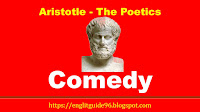Aristotle
- The Poetics
Limitations
Aristotle has his limitations. In the first
place he assigns a higher rank to tragedy than it deserves. In doing so he
forgets his own scientific approach and follows the established tradition. The
epic in which success is so difficult to achieve that about a dozen great epics
are all that the world can boast of, is assigned the second rank. The
succeeding ages were quick to see that unity of action is more difficult of
attainment in the sprawling length of an epic than in the shorter compass of a
tragedy, so he who can succeed in the former should be the greater artist,
there being no difference between the two in other respects.
Aristotle
himself bestows more praise on Homer’s Iliad and Odyssey for their artistry in
plot, character, thought and diction on the same things in his favorite
tragedian Sophocles. The omission of the lyric, a major poetical form right
from the earliest times in ‘a treatise concerning poetry’, particularly after
Pindar had shown what could be done with it, is also inexplicable.
Aristotle
is also more concerned with the form of the literary types he deals with than
with their content and so lays down rules only for the former. But perhaps
Poetics was not intended to be a comprehensive review of all the problems of
poetry. It seems to concern itself only with those that, in the opinion of
Aristotle, had not been correctly understood. Its incompleteness is another
explanation. However, for the largeness of its view-scientific, historical,
philosophical, psychological- and the depth of its observation, it is even in
its fragmentary form, one those rare books that have powerfully moved mankind.






















0 Comments